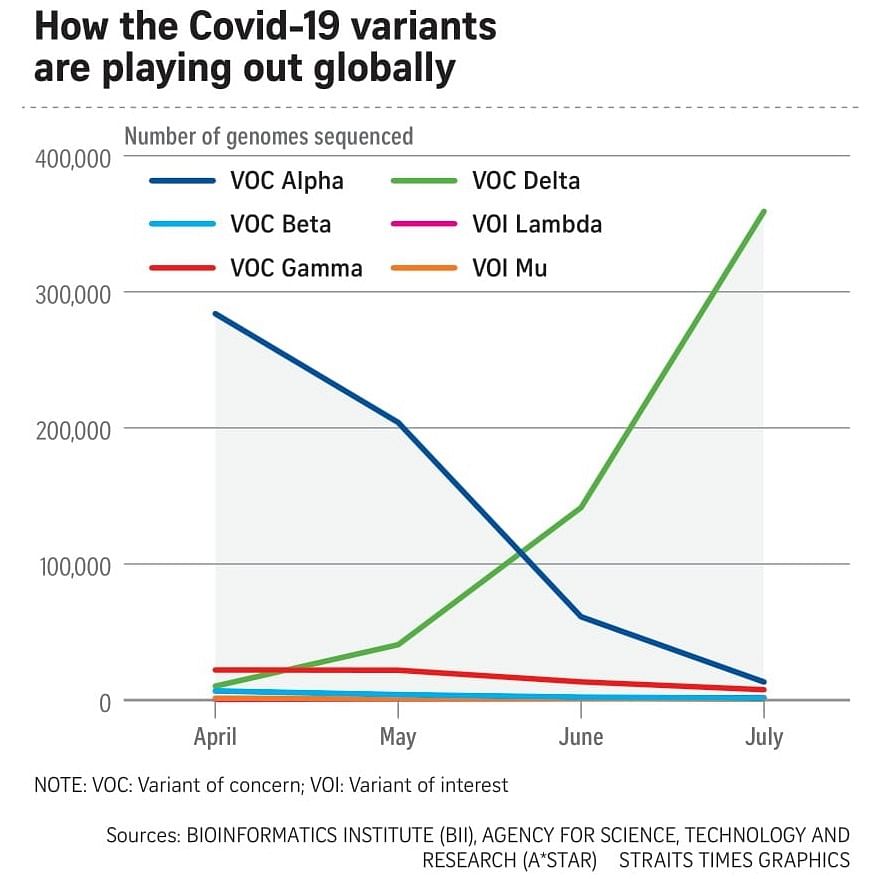New Covid-19 variant of interest, Mu, unlikely to overtake Delta: Experts
Sign up now: Get ST's newsletters delivered to your inbox

Health workers care for a Covid-19 patient in the intensive care unit in Bogota on May 22, 2021.
PHOTO: AFP
Follow topic:
SINGAPORE - The World Health Organisation upgraded the Mu mutation of the coronavirus to a variant of interest (VOI) on Monday (Aug 30).
But experts say it is unlikely to overtake the Delta variant of concern (VOC), which now accounts for more than 90 per cent of sequenced infections globally in the Covid-19 pandemic.
Dr Sebastian Maurer-Stroh, executive director of the Bioinformatics Institute of the Agency for Science, Technology and Research, said the Mu variant accounts for less than 1 per cent.
He added: "In order to cause larger outbreaks, any variant needs to be 'fit' and these variants are classified to be of interest because they contain features that are known to make viruses successful."
However he pointed out: "In South America, where both Lambda (declared VOI on June 14) and Mu had early appearances and outbreaks, numbers are now declining, and Delta has been taking over. In terms of total numbers and global distribution, Delta continues to be the dominant variant."
Delta was named a VOI on April 4 and a VOC on May 11. Although a relative new comer, Delta has superseded the other three VOCs - Alpha, Beta and Gamma - to become dominant globally.
Associate Professor David Allen, associate vice-president for health innovation and translation at the National University of Singapore, holds similar views.
Prof Allen, who helped Singapore set up training in infectious diseases three decades back, and was the founding head of infectious diseases at Tan Tock Seng Hospital, said: "I think we need to be aware of Mu and its potential to cause harm as we do for all variants, but I would not elevate Mu to a source of worry at this time."
He added: "It's Mu's potential to cause harm, more than its record for doing so, that has our attention."
In Colombia, where Mu emerged in January and had soared to account for more than 80 per cent of all sequenced genomes there, it is now rapidly losing ground to Delta, which reached the South American country a couple of months back.
Said Prof Allen: "Delta is rapidly overtaking Mu for the 'market share' and Mu's share has commensurately shrunk. If the trend continues, Delta will be the dominant variant in Colombia in the next couple of weeks."
Globally, Prof Allen said: "At this point in the pandemic, Delta has become the standard to which other variants are compared when thinking about transmission and variant dominance in a community.
"It is likely that the combination of Delta's more rapid rate of reproduction and more efficient transmission makes it a formidable competitor for the other variants."
Dr Maurer-Stroh added that current vaccines would probably work against these VOIs as well as they do against Delta, as the range of changes causing the mutations may be comparable.
As for the future, he said: "The virus is behaving as expected, which is a good thing as it becomes more predictable.
"We know that it will continue changing and the same changes that make it more successful in one variant seem to be recurring in different combinations in new variants."


